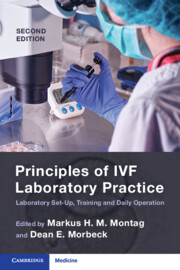Book contents
- Principles of IVF Laboratory Practice
- Principles of IVF Laboratory Practice
- Copyright page
- Contents
- Contributors
- Foreword
- The Evolution of IVF Practice
- Section 1 Starting a New Laboratory and Training Protocols
- Chapter 1 Establishing and Equipping a New IVF Laboratory
- Chapter 2 Basic Embryology Skills and Responsibilities in the IVF Laboratory
- Chapter 3 Sperm Preparation for IVF
- Chapter 4 Oocyte Pick-Up for IVF
- Chapter 5 Embryologist Training: Embryo Transfer
- Chapter 6 ICSI for IVF
- Chapter 7 Embryo Assisted Hatching for IVF
- Chapter 8 Embryo Biopsy for IVF
- Chapter 9 Vitrification for IVF
- Section 2 Pre-procedure Protocols
- Section 3 Gametes
- Section 4 Insemination/ICSI
- Section 5 Fertilization Assessment
- Section 6 Embryo Assessment: Morphology and Beyond
- Section 7 Embryo Cryopreservation
- Section 8 Embryo Transfer
- Section 9 Quality Management
- Index
- References
Chapter 7 - Embryo Assisted Hatching for IVF
Training Protocol and Method
from Section 1 - Starting a New Laboratory and Training Protocols
Published online by Cambridge University Press: 07 August 2023
- Principles of IVF Laboratory Practice
- Principles of IVF Laboratory Practice
- Copyright page
- Contents
- Contributors
- Foreword
- The Evolution of IVF Practice
- Section 1 Starting a New Laboratory and Training Protocols
- Chapter 1 Establishing and Equipping a New IVF Laboratory
- Chapter 2 Basic Embryology Skills and Responsibilities in the IVF Laboratory
- Chapter 3 Sperm Preparation for IVF
- Chapter 4 Oocyte Pick-Up for IVF
- Chapter 5 Embryologist Training: Embryo Transfer
- Chapter 6 ICSI for IVF
- Chapter 7 Embryo Assisted Hatching for IVF
- Chapter 8 Embryo Biopsy for IVF
- Chapter 9 Vitrification for IVF
- Section 2 Pre-procedure Protocols
- Section 3 Gametes
- Section 4 Insemination/ICSI
- Section 5 Fertilization Assessment
- Section 6 Embryo Assessment: Morphology and Beyond
- Section 7 Embryo Cryopreservation
- Section 8 Embryo Transfer
- Section 9 Quality Management
- Index
- References
Summary
The zona pellucida surrounding human embryos may be breached to facilitate the process of hatching following in vitro culture, either to promote implantation or in preparation for removal of cells for pre-implantation genetic testing (PGT). This technique is referred to as ‘assisted hatching’ (AH). Since publication of the first studies on AH in the 1990s aimed at improving implantation and pregnancy rates, in which a chemical method was used to breach the zona, multiple variations of the technique have been attempted by practitioners. Application of AH prior to fresh embryo transfer in young, good-prognosis patients has been repeatedly shown to be ineffective. The method continues to be successfully applied to fresh embryos for embryo biopsy and outcome data support application in frozen–thawed (vitrified–warmed) embryos and oocytes prior to transfer. Proper training, patient selection and methodology are important to the clinical success of AH as any other micromanipulation technique. Complete removal of the zona pellucida to avoid trapping has been proposed as an alternative to partial breach but studies are scarce.
- Type
- Chapter
- Information
- Principles of IVF Laboratory PracticeLaboratory Set-Up, Training and Daily Operation, pp. 47 - 53Publisher: Cambridge University PressPrint publication year: 2023

